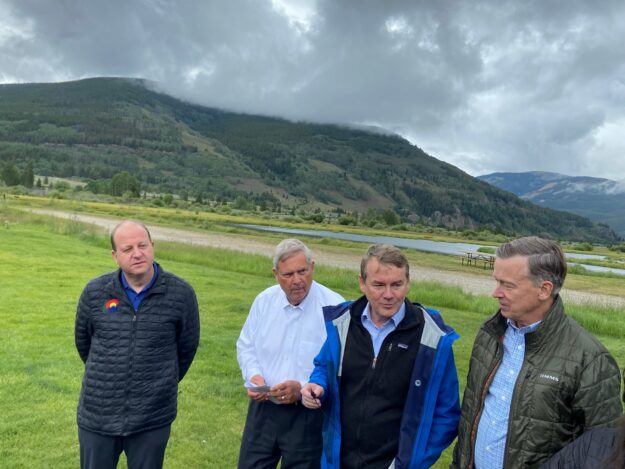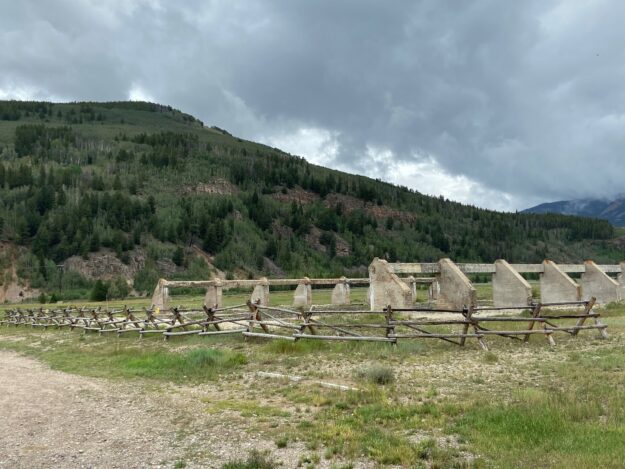Widgetized Section
Go to Admin » Appearance » Widgets » and move Gabfire Widget: Social into that MastheadOverlay zone
Colorado Dems lobby Vilsack, Biden to protect Camp Hale as National Monument

CAMP HALE, Colo. – Seemingly waving the white flag on getting a wilderness bill that’s passed the House five times through the logjammed U.S. Senate – at least for now – Colorado’s Democratic leadership on Tuesday invited U.S. Agriculture Secretary Tom Vilsack to this historic, high-country military training ground to plead for presidential action.
“Our preference, obviously, is to pass the CORE Act,” Sen. Michael Bennet said of the Colorado Outdoor Recreation and Economy Act, which U.S. Rep. Joe Neguse has shepherded through the House, in one form or another, five times.
“We’re going to continue to fight for that,” Bennet added. “The places that are appropriate for other designations, like a National Monument designation or a mineral withdrawal, we’ll look at that, but we’re just going to have to decide what’s going to be appropriate, and we haven’t made those decisions yet.”
The CORE Act combined four bills to protect 73,000 acres of Colorado’s federally owned public lands as new wilderness and 80,000 acres as new recreation and conservation management areas that preserve existing outdoor recreation uses.
The bill includes a first-ever designation for Camp Hale as a National Historic Landscape to honor the 10th Mountain Division ski troopers who trained here and fought in Italy and Alaska during World War II and then returned home to launch the state’s iconic ski industry.
Colorado Democrats are hoping President Joe Biden, with some urging from Vilsack — whose USDA oversees the U.S. Forest Service land at Camp Hale – will designate the area a National Monument. They are also hoping Biden will use administrative withdrawal to keep intact the CORE Act’s ban on new oil and gas drilling in the Thompson Divide near Carbondale.
“The two paths are not mutually exclusive,” said Gov. Jared Polis, who championed an early version of the CORE Act more than a decade ago when he was serving in the House. “Taking additional executive actions can help provide momentum for future legislative protections.”
But a future Republican president can strip away higher levels of protections for public lands if they’re not passed by Congress, as former President Donald Trump did by shrinking Bears Ears and Escalante in Utah – a move since reversed by Biden.
And there was a clear sense of urgency among the numerous local politicians, conservation groups, sportsmen and recreation-economy advocates who toured Camp Hale with Vilsack on Tuesday. With the possibility of losing control of the House, and possibly the Senate, on Nov. 8, Democrats are nervous.
“I take away a sense of urgency,” Vilsack said of when he will broach the topic with Biden. “This conversation needs to take place in a sense yesterday, so I’m going go back, make sure that the president and the White House is fully briefed on this, and I’m going make sure that our team is moving as expeditiously as they possibly can, to do whatever we can, and encourage the president to give us the authority to proceed.”
Despite a committee vote on the bill, Republicans in the Senate continue to block the CORE Act’s passage, with at least 10 GOP senators needed, along with every Democrat, in order to avoid a filibuster. In the House, where bills can pass on a simple majority, Republican U.S. Rep. Lauren Boebert, who represents the majority of the state’s Western Slope and is a staunch oil and gas advocate, has called the bill a “land grab.”
Bennet, who’s been working on the bill as long as Polis, points to polling showing bipartisan support for the CORE Act.
“One of the amazing things about the CORE Act is how bipartisan the support has been,” Bennet said. “I expect there always to be criticism from people who don’t have an appreciation for the importance of public lands in our state, but I don’t think that’s most Democrats and Independents, and I don’t think it’s most Republicans either.”
Asked why Biden hasn’t already used executive action to act on protecting CORE Act lands, Vilsack rattled off a long list of things that have been occupying the president’s time, from the American Rescue Plan to the bipartisan infrastructure bill to the Chips and Science Act to the Inflation Reduction Act and its massive climate change investment – a bill Biden signed today.
Colorado U.S. Sen. John Hickenlooper chimed in with “he’s been busy … and reducing the deficit by $300 billion just while he was at it [a feature of the IRA]. As well as the first bipartisan gun-safety built in 30 years.”
Picking up the theme, Bennet jumped in with, “I’ll add, while we’re on this hallowed ground [of Camp Hale], passing and signing the PACT act, which veterans have been fighting for for years and years to deal with the toxic exposure that people have faced because of burn pits and other kinds of things.”
Vilsack added the infrastructure bill and the IRA budget bill will provide funds for better forest and water management as climate change impacts the headwaters of the Colorado River, which was the subject of another dire federal report on Tuesday.
“So it’s [public lands] designations, it’s forest management, it’s providing assistance and help to farmers to do a better job of using scarce water resources more efficiently, it’s providing disaster assistance,” Vilsack said. “It’s a lot of work that needs to be done as we deal with the changing climate and its impact on water and water availability.”

David O. Williams
Latest posts by David O. Williams (see all)
- The O. Zone: Bold Colorado sports predictions for remainder of 2024 - November 18, 2024
- Lindsey Vonn set to rejoin U.S. Ski Team - November 14, 2024
- Rail company eyeing Eagle County service no longer involved in Utah oil train proposal - November 13, 2024


